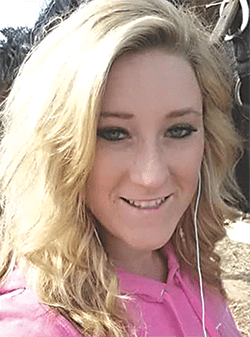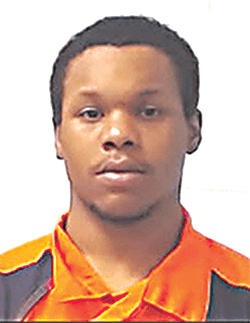
by Tom Chillemi
Anguish was evident on the faces of the victim’s family members as they entered Middlesex Circuit Court for the sentencing hearing of convicted murderer Alvin Bernard Keyser, 24, of Topping.
Eighteen months has passed since Keyser strangled Terri Lynn St. John, 23, in the driveway of her residence in Wake before dawn on February 27, 2018. Keyser pled guilty to strangling St. John, stuffing leaves in her mouth and nose and hiding her body in a briar patch about a mile from her home.
The passage of time had not eased the pain of her father, Terry St. John, who testified at Keyser’s sentencing hearing September 4, 2019. “No parent should be forced to . . .” said Mr. St. John from the witness stand, raising his voice and waving a copy of his victim witness statement at Keyser who sat staring down at the table.
Mr. St. John told the court he still has trouble dealing with tragedy and has sleeping problems. He said Terri Lynn St. John’s 4-year-old daughter still looks for her mother. “The person who caused this has no clue as to the effect” on the family, he said, staring at Keyser.
Mr. St. John said he would give his own life if it would bring back his daughter.
“Where’s my mommy?”
Ken Moody Sr., grandfather of Terri Lynn St. John’s children, asked the court to give Keyser the maximum sentence of 40 years. “Nobody should have to go through this.”
It was Moody who found his two grandchildren, ages 22 months and three years, alone in their home with the door left open on February 27, 2018, when he went to check on Terri Lynn St. John, who had not shown up for work.
Moody said Terri Lynn St. John’s daughter is now 4 years old and is getting old enough to remember. She asks, “Where’s my mommy?”
The children, who are now 3 and 4 years old, often are looking for their mother and the daughter has trouble sleeping, testified the victim’s sister, Maggie St. John, tearfully. “They don’t want their dad to leave.”
Maggie St. John stared at Keyser and said her sister’s murder affects her “every day all day long.” Near the end of her testimony, she lashed out at Keyser. “You look like you are falling asleep over there,” she said.
Defense
Keyser’s defense attorney, Amy Van Fossen, put Dylan Norwood on the witness stand who said he made friends with Keyser in fifth grade. He testified Keyser helped work on two Habitat for Humanity houses with him. Norwood said Keyser “would do anything for you.”
They “partied” and played football at Middlesex High School (MHS) before Keyser dropped out of school.
Also testifying for the defense was Cynthia Beverley, who operates a state certified day care service in Wake where Keyser’s two children stayed. She said Keyser had been a chaperone on field trips.
Beverley said that on the day of the murder, she and Keyser had a “normal conversation” when he picked up his children.
Another of Van Fossen’s witnesses was Earnest Robinson, a retired deputy who held the rank of major with the Middlesex Sheriff’s Office. Robinson said he had known Keyser through sports at MHS. Keyser had called the Middlesex Sheriff’s Office trying to reach Robinson about two hours after he murdered St. John. Eventually, Keyser talked to Robinson, who told him to talk to a deputy if he had information.
Autopsy
Dr. Jeffrey Gofton, a state medical examiner since 2001, testified the cause of death was strangulation and obstruction of the airways. The “hyoid” bone in the neck was broken causing the airway to collapse and leading to wheezing and eventually unconsciousness. Leaves had been stuffed in St. John’s nose and mouth, he testified.
Final arguments
Middlesex Commonwealth’s Attorney Michael Hurd asked the court to “consider the brutality” of the murder and how Keyser strangled her and then stuffed leaves in her nose and mouth “to make sure she would die.”
He said Keyser went to Terri Lynn St. John’s house to confront her and keep her from talking about him selling drugs. When confronted with evidence during the investigation, said Hurd, Keyser told “lie after lie after lie.” Keyser and Terri Lynn St. John knew each other.
Hurd argued for the maximum sentence of 40 years plus five years for concealing a body. The longer Keyser is in prison and the older he will be on release, the safer the public will be, he said.
Van Fossen asked the court to sentence him to 15 years, which she said is in the low to mid range of the sentencing guideline.
Before sentencing, Keyser read a short statement and said he was “sorry . . . I wish I could take it back. I take responsibility.”
Sentence
Judge Jeffrey Shaw sentenced Keyser to 30 years for the murder and five years for concealing a dead body—a total of 35 years to serve. Judge Shaw said Keyser will get credit for the 18 months he’s served awaiting trial. Keyser was arrested and jailed on March 1, 2018, two days after the murder.
Convicted persons must serve at least 85% of their sentence, explained Hurd. Keyser’s sentence of 35 years is 420 months and 85% of that is 357 months, or about 29 years and 9 months. That equates to a possible release date of December 1, 2048, said Hurd. (See related story.)
Judge Shaw also ordered three years post release supervision and a sentence of three years that will be imposed if Keyser violates probation upon his release from prison, when he will be 54 years old.
The three years of post release supervision was ordered to be concurrent, which means although ordered on each charge, he is only facing 3 years of supervision after release.
Why the plea agreement?

Middlesex Commonwealth’s Attorney Michael Hurd explained why a plea agreement was reached with Alvin Bernard Keyser, who pled guilty to second degree murder.
Keyser, who strangled Terri Lynn St. John on February 27, 2018, was originally charged with first degree murder, which “requires proof of premeditation and deliberation,” explained Hurd. In Virginia, murder is presumed to be in the second degree.
Both Keyser and one of the prosecution’s witnesses for the Commonwealth claimed that Keyser was intoxicated on the morning he killed St. John and hid her body. “By case law, intoxication eliminates premeditation, so if the witness and Keyser were believed, Keyser could only be found guilty of second degree murder, not first” said Hurd.
Autopsy
Hurd also explained that both medical examiners who were present for the autopsy moved out of state. “It was possible that we would not have had autopsy testimony at the trial as to cause of death,” said Hurd. “Even if another medical examiner was allowed to testify as an ‘expert witness,’ the medical examiner’s office would not commit to whether death occurred when the victim was strangled at her home, or when leaves were inserted into her airways (mouth and nose).”
Since murder is presumed to be in the second degree, said Hurd, “A jury would not be comfortable in deciding that the defendant had premeditation and deliberation to kill (required for first degree murder) when the medical examiner can’t decide which act killed the victim.”
The confession
Hurd said he responded to the defense attorney’s motion to suppress Keyser’s statements with a 30-page memorandum against suppression. “However, without going into detail, we had to realize that without the Miranda warnings being given, and the language and means used to elicit the confession, there was a strong possibility that the confession would be suppressed, and if so, the case could be dismissed,” Hurd explained. “I have previously seen a trial judge suppress a confession less problematic than this one.”
“The detectives, the victim’s family, and I discussed the case thoroughly, and we all agreed that there was a higher likelihood of the confession being suppressed than there was of a finding of first degree murder,” he said.
Hurd said he compared the sentencing guidelines for the offenses. “With the defendant willing to plead guilty to second degree murder, the choice was obvious to us to accept that and concentrate on sentencing, as it was likely that the judge would exceed the guidelines. That was the right decision.”
Sentence comparison
The maximum sentence for second degree murder is 40 years.
First degree murder carries a maximum sentence of life in prison. Hurd noted that the high range of sentencing guidelines for first degree murder (and concealment of a body) would have been 35 years and 4 months.
Middlesex Circuit Court Judge Jeffrey Shaw sentenced Keyser to a total of 35 years for second degree murder and for body concealment. This sentence is nearly the same as the guidelines for first degree murder, Hurd noted.



